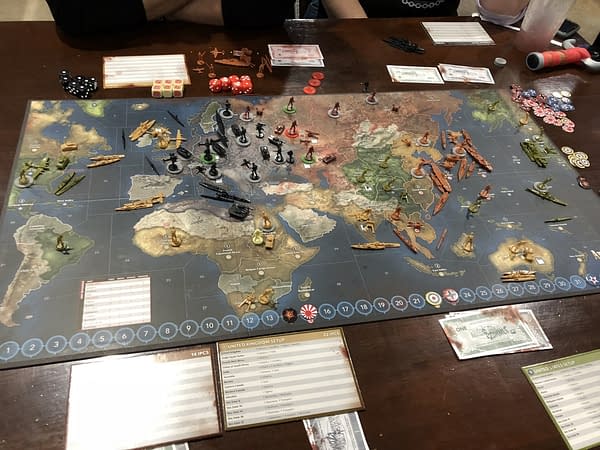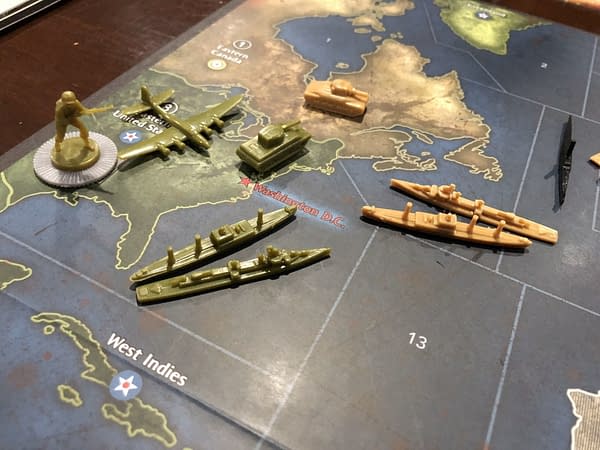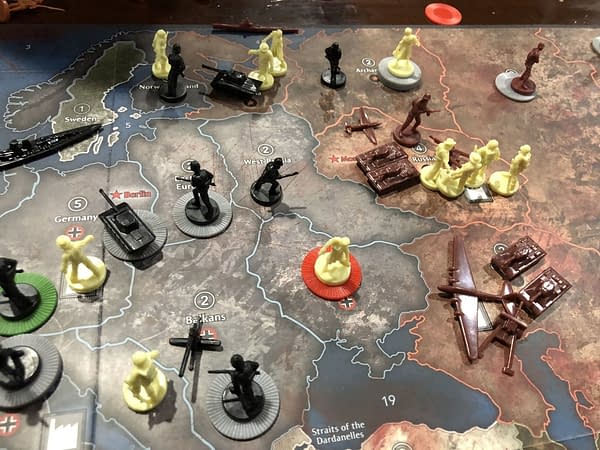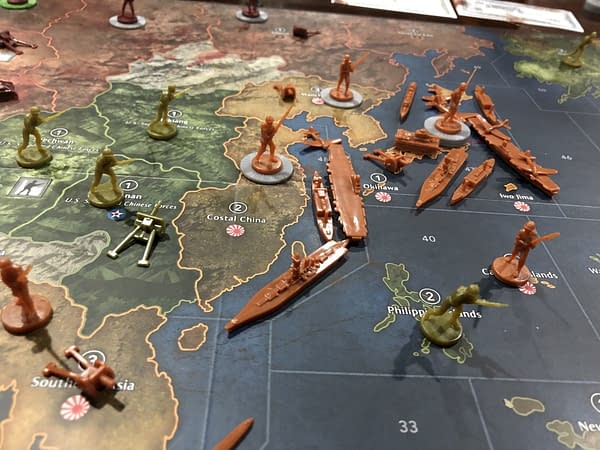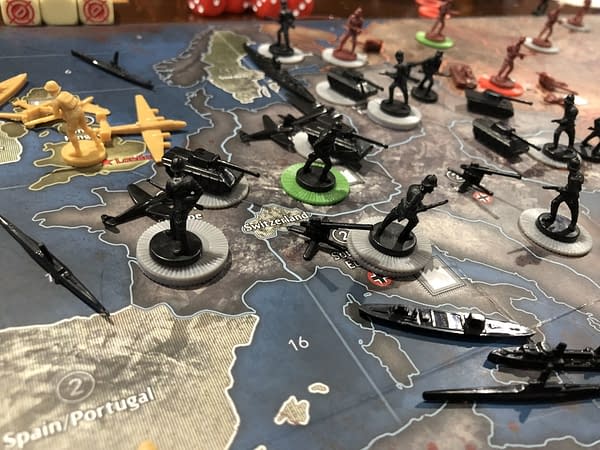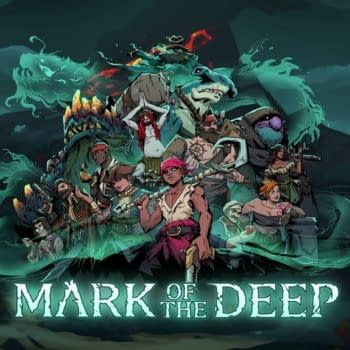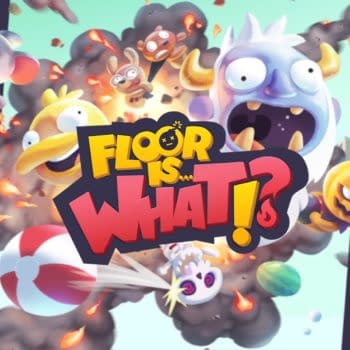Posted in: Board Games, Games | Tagged: Axis & Allies & Zombies, Scott Van Essen, wizards of the coast
Rewriting War: An Interview With WotC's Scott Van Essen
Earlier this week we had a chance to review Axis & Allies & Zombies from Wizards of the Coast and Avalon Hill, in which Scott Van Essen had a hand in creating. Today, we got a chance to chat with Essen about the game and the work that went into recreating a classic title with a modern touch.
Scott Van Essen

BC: What inspired you to create this version of Axis& Allies?
Scott: At his first all-hands meeting, our (then new) president Chris Cocks—who is a huge fan of Axis & Allies—said (paraphrasing) "…We should try new things and push the envelope, like what if we did Axis & Allies…and Zombies?" As it turns out, we had already been bouncing that idea around the office for years, but we had never come up with a simple and satisfying way of capturing the feel of zombies in Axis & Allies. Now, with that little nudge, we quickly put together a team to do some exploratory design. It only took a little while to realize we were onto something.
What was it like for you to basically break the game in certain areas and then add this new content in?
In many ways, I feel that most of our task was "unbreaking" the game more than breaking it. Our goal from Day One was that this game had to be an Axis & Allies game first. We wanted to hit the tropes and emotional beats of the zombie genre, but wherever possible through the rules and structure of the core Axis & Allies game. Two other important goals were making the game fun and meeting expectations for how zombies would play. This led us to add in a ton of new systems to the game to achieve those goals and patch problems. Once we had settled on a satisfying and evocative play pattern, then the task was to figure out how to implement those systems leveraging existing rules as much as possible and new rules as little as possible. This was in service of the intertwined goals of staying true to Axis & Allies, reducing complexity, and taking advantage of existing players' rules knowledge and instincts. In fact, every time we found an existing rule that could be tweaked to handle zombies we found we were able to collapse multiple interrelated new rules into that one old rule, and that gave us high confidence that we were on the right track. I share some details about some of those in my answer to the next question.
Were there any difficulties you came across when play-testing it that you refined later, or was it pretty smooth sailing the first time out?
Our three core mechanics are:
- When units are destroyed, they turn into zombies (initially, this was all units, not just infantry).
- Cards cause zombies to randomly pop up all over the board.
- Zombies roll a special die that can hit the attacker or defender when you're fighting among them.
We arrived at these very quickly in early design and they are what convinced us that we were on to something. We went through many iterations of these as we found the fun and fixed problems, for instance: Early on, zombies couldn't capture territories, they just existed there. If you fought in their presence, they would participate in the fight and were dangerous to both sides, but they didn't impact movement and weren't relevant behind the front lines. We added the zombie's attack phase to allow the zombies to attack your troops wherever they are. This made them the kind of threat we wanted and made sense creatively. (The army has fenced them off so they're mostly safe, but every now and then they break through the fences.) The player reaction was to move all troops out of zombie-occupied territories to ignore the threat, so we allowed the zombies to hit your income for that territory as well. Now there was an economic cost to leaving zombies around everywhere and some incentive to clear them out. This was the epiphany point where we realized that having zombies be able to capture otherwise unoccupied territories did all the things we wanted it to do. It simplified the income loss, made travel through zombie-controlled territories slower and riskier, and it incentivized you to either attack the zombies to clear them out or post garrisons to maintain the territories. And it did all of that with far fewer and simpler rules than we had had previously.
My favorite innovation was the rescued survivors rule, or what I like to call "We saved you! You're welcome. Welcome to the Army." Fairly late in development, we had a stable rule, but one problem that I was observing in a large subset of our playtesters was that they were not "cleaning up their backyard". If a zombie appeared in and took over a hard-to-reach territory, they judged that it wasn't worth the resources and effort to go reclaim that territory. The problem was that a couple IPCs per turn really does add up, and over time they were falling behind their opponents and losing the game more often, but they weren't connecting that loss to the long-term drain on their economy that they had allowed to persist, and so they weren't able to learn from their mistake. We needed to give them a carrot to teach them how important it was to send missions out to recapture zombie-controlled territories. The key was realizing that any zombie-infested region will create thousands of armed survivors who have gone through a remarkably effective (if slightly unconventional) boot camp and any army would gladly incorporate them into their ranks. This worked phenomenally to encourage players to divert forces to housekeeping and garrisoning as well as giving those expeditionary forces just enough of an injection of units to keep them viable. It also served a secret objective of creating more infantry on the board to eventually turn into more zombies.
What kind of a challenge was it to make the zombies their own enemy that people had to fight against, but that neither side could unite to fight?
Early on we discussed having the zombies be controlled by a third faction. We decided against it because we felt that there was no way to have that faction be a satisfying play experience and still feel like zombies. (The more agency the controller had, the less mindless the zombies feel. The less agency they have, the more you feel like you're going through the motions of a game rather than actually playing). Having agreed on having them be an 'NPC', we needed both a way to control them and a way for them to 'win'. The zombie "AI" needed to feel right and lead to fun play patterns, but we had a lot of limitations. The more movement and active attacking the zombies had, the more rules, special cases, and game steps would be necessary. Fortunately, staying in one place and only attacking people within reach is right in zombies' wheelhouse, so we were able to get a lot of the feel that we wanted with minimal rules and tracking. We added several different ways for players to move the zombies around (usually flavored as anti-zombie technology or special forces) to have some of the larger swings in the zombie's deployment without it feeling like the zombies had a plan or agency.
Next was their objective. We instantly went to a "Zombie Apocalypse" rule where the zombies won (and the players lost) when they had overrun a large enough fraction of the world. Our initial hope (and that of nearly every fan and interviewer we'd talked to) is that we would have moments where enemies are forced to work together for survival. For this very reason, we initially had. In many games, this worked fine, and it very occasionally created small moments that seemed almost like cooperation, where enemies briefly paused from fighting each other to clear out zombies and keep the game going. Unfortunately, this was overshadowed by a more serious problem. This rule created an incentive where when a player realizes they can't win, their 'best' move was to intentionally create zombies and abandon their zombie-occupied territories, bringing on the zombie apocalypse in an "If I can't win, you can't either" move. This is frustrating to play against and has little counterplay, so we cut the rule. This led us to an important discovery. When players fall behind in dealing with zombies, they hit a critical point where it is no longer feasible for them to keep up with them, and all of their resources are devoted to fighting zombies instead of bringing the fight to their opponents. Those games, while not common, become miserable slog-fests that never really end. We realized that the Zombie Apocalypse rule had been serving another valuable function, which was to end games in a creatively satisfying way before they got to that miserable slog-fest. So, we brought it back, but having learned our lesson from before we changed it from "Everybody Loses" to "Humanity loses, but maybe you can create a big enough enclave of safety to be the winningest loser", which didn't incentivize those un-fun moments.
Looking back on the lessons learned from this episode, we also reflected on the nature of zombie stories in various media and realized that while the trope of "an external threat forces enemies to work together" is appealing and does show up from time to time, the more common trope is "Zombies raise the stakes of existing conflicts by forcing enemies into close proximity, making them fight over scarce resources, injecting unpredictability, and ramping up the consequences of failure." It is this philosophy that we arrived at and embraced for the latter part of our design time.
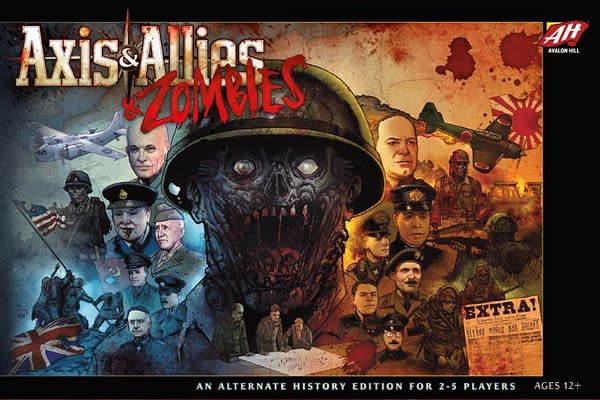
How do you think the game will resonate with older players who have loved Axis& Allies in previous versions?
Axis & Allies & Zombies makes you reevaluate everything you thought you knew about playing the game. It makes your games play out differently, forces you to improvise and constantly adjust your plans, and is constantly throwing curveballs. I believe that established players coming to Axis & Allies & Zombies for the first time will be excited by the opportunity to develop whole new strategies, be challenged in new ways, be always on their toes, and to really embrace the randomness and terror of fighting zombies. Few moments are sweeter than watching your opponent's army get consumed by the massive horde of zombies you led them into.
Now that you've created this version, what other versions would you like to explore?
Well, I'm personally very interested in taking a swing at Axis & Allies & <REDACTED> or Axis & Allies & <CENSORED>. In all seriousness, I wish I could share some of the ideas we've been pitching each other. Suffice it to say that there is no shortage of ideas for either the traditional Axis & Allies line or future alternate history installments. But for now, we're going to have to ask you to enjoy Axis & Allies & Zombies now that it has been released while we go back to brewing what's next.


